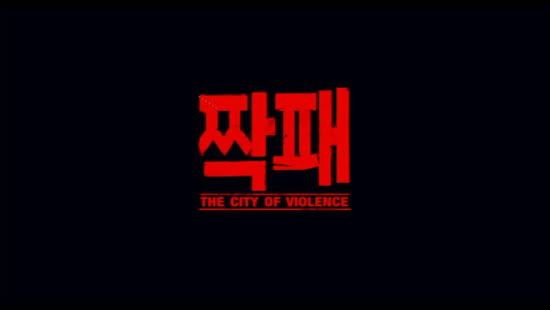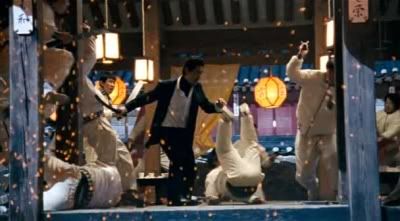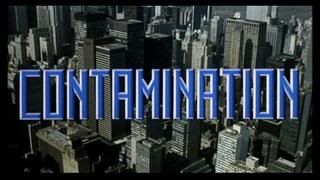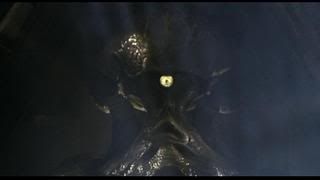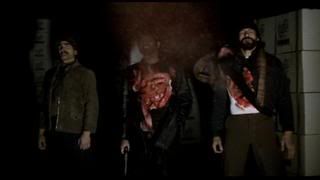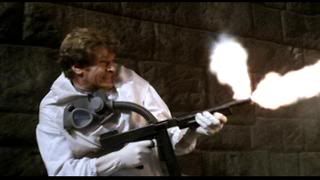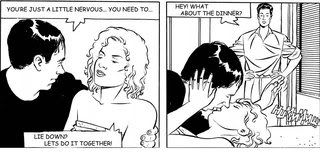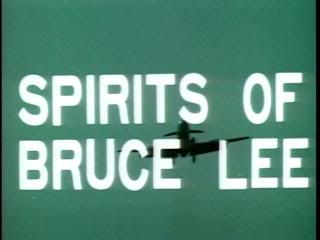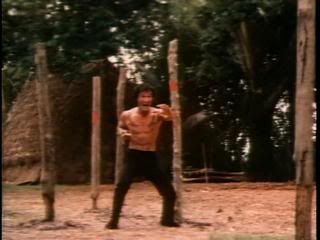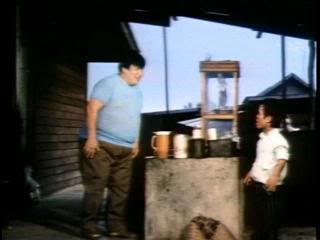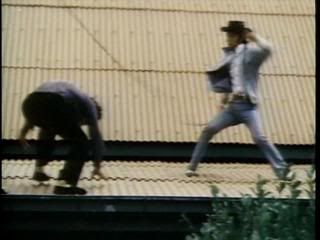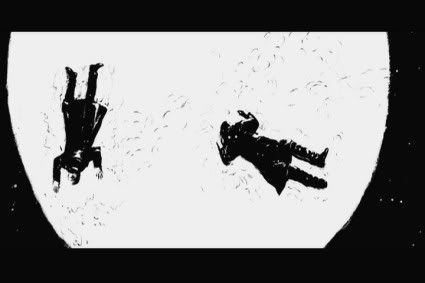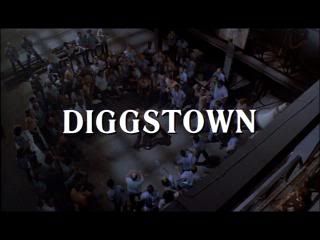
What is it about boxing that makes great films? Two men beating themselves senseless seems to take on a grander symbolism when put on film, and the struggle between the ropes can be seen to represent almost any larger conflict, even if it's the one inside the fighter him(or her)self. In Michael Ritchie's Diggstown the director forgoes much of the brutal metaphor of other films as the boxing matches serve to carry out the promise of a slow moving (though sweatily entertaining) first half.
James Woods stars as con man Gabriel Caine, who travels to Diggstown, Georgia (with his partner Fitz (the amazing Oliver Platt) to set up his biggest con yet. Diggstown, named after local boxing hero Charles Macom Diggs, loves its boxing, and Fitz convinces the town magnate John Gillon (a sublimely sleazy Bruce Dern) to bet $100,000 that he can provide a fighter that can beat any ten Diggstown men in one day. This fighter is the now 48-year old Honey Roy Palmer.(Louis Gossett Jr.), a former partner of Caines who is dragged back into the ring for one last shot at glory (and a big pay day). The wagers begin to increase as the stakes get personal (and violent) and there are more than a few twists before all is said and done.
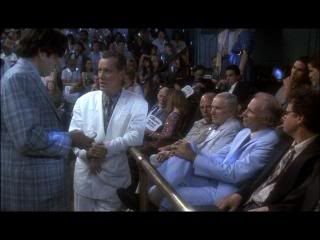
James Woods stars as con man Gabriel Caine, who travels to Diggstown, Georgia (with his partner Fitz (the amazing Oliver Platt) to set up his biggest con yet. Diggstown, named after local boxing hero Charles Macom Diggs, loves its boxing, and Fitz convinces the town magnate John Gillon (a sublimely sleazy Bruce Dern) to bet $100,000 that he can provide a fighter that can beat any ten Diggstown men in one day. This fighter is the now 48-year old Honey Roy Palmer.(Louis Gossett Jr.), a former partner of Caines who is dragged back into the ring for one last shot at glory (and a big pay day). The wagers begin to increase as the stakes get personal (and violent) and there are more than a few twists before all is said and done.

A lot closer to The Sting than Raging Bull, Diggstown practically wallows in its trashiness. Woods, Platt and Dern seem to be having a contest to see who can be the seediest swindler, and I have to say that Dern absolutely walks away with the prize. John Gillon isn't handcuffed by being likable, and Durn is able to inhabit the character as a man who will do absolutely anything (including murder) to win. A pre-fight speech where Dern concocts a plan to basically cripple Palmer for life before gathering his fighters in a circle to pray "Dear Lord, please give us the strength and courage to tear this man from limb to limb." is a highlight, and Dern manages to walk a line of cartoonishness to create one of filmdom's most memorable villains.
Woods plays a grifter with a heart of gold, and he gets his share of good one-liners opportunities to display his trademark cockiness. His interplay with Gossett Jr. is inspired, and the two have some strong chemistry that provides a number of funny moments in the film's second half. Oliver Platt doesn't have as much to do, but he does it wonderfully though he sort of vanishes in the final act. Supporting roles are filled by the great Randall 'Tex' Cobb as Caine's prison buddy, and Heather Graham as the (thankfully not intolerable) love interest.
Woods plays a grifter with a heart of gold, and he gets his share of good one-liners opportunities to display his trademark cockiness. His interplay with Gossett Jr. is inspired, and the two have some strong chemistry that provides a number of funny moments in the film's second half. Oliver Platt doesn't have as much to do, but he does it wonderfully though he sort of vanishes in the final act. Supporting roles are filled by the great Randall 'Tex' Cobb as Caine's prison buddy, and Heather Graham as the (thankfully not intolerable) love interest.
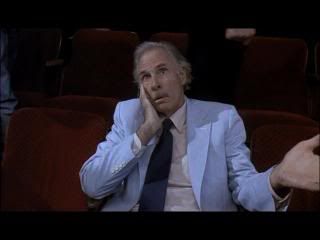
The film's biggest weakness is an inconsistency of tone, with it sometimes veering from broad comedy (say, when a boxer bails on his fight after being given laxatives) to serious drama. Ritchie effectively shows the high stakes involved in the bet, but things often turn a bit maudlin at inopportune moments. Also, while Ritchie does a serviceable job with the boxing scenes, it's fairly pedestrian compared to some of the famously staged boxing scenes in film, from Rocky to Raging Bull. To his credit, however, the matches always remain intelligible and are staged very effectively.
Once the climactic boxing match begins, the pace of the film speeds up considerably and doesn't calm down until the effectively twisty ending. For experienced viewers the outcome may never feel in question, but writer Steven McKay (working from a novel by Leonard Wise) throws a few well timed curve balls right at the film's climax.
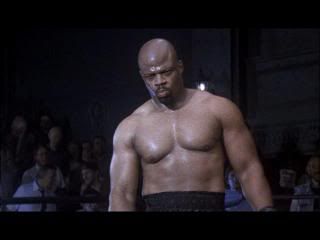
Once the climactic boxing match begins, the pace of the film speeds up considerably and doesn't calm down until the effectively twisty ending. For experienced viewers the outcome may never feel in question, but writer Steven McKay (working from a novel by Leonard Wise) throws a few well timed curve balls right at the film's climax.

The film is presented non-anamorphic in its original 1.85:1 aspect ratio. The print is very dark and shows a significant amount of grain, particularly in the scenes where Honey Roy Palmer is jogging, though certainly a large improvement on my well worn VHS tape. Sound is perfectly adequate, and all of the bone crunching hits and fast talking come through clearly.
The DVD is bare bones and features no extras outside a theatrical trailer and the choice of English or French audio and subtitle tracks.
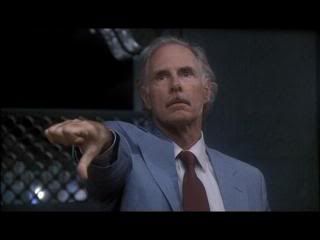
The DVD is bare bones and features no extras outside a theatrical trailer and the choice of English or French audio and subtitle tracks.

A highly entertaining and underrated film from the late director of Fletch, Diggstown deserves a better DVD treatment. If only so we can all get a better appreciation of Bruce Dern's ability to transform himself into a human-rodent hybrid. Worth digging out.

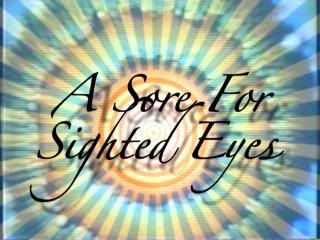
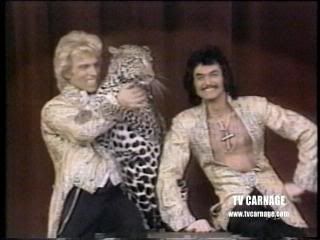
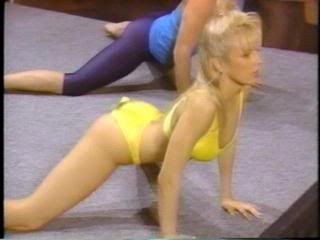
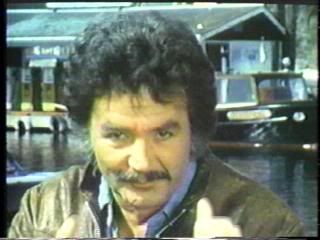
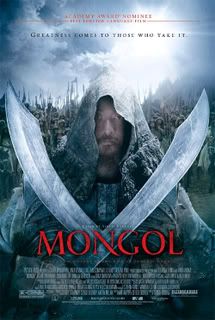 Mongol (2007) - The early life (and love) of Genghis Khan is brought to life in this beautiful, though sometimes meandering, Russian film from director Sergei Bodrov. The film stars the great Tadanobu Asano (Ichi The Killer) as Temudjin, and the early scenes demonstrate what was a very difficult and violent upbringing, later to shape him into a fierce warrior on the battlefield. Everything about the film is epic, from the amazing scenery to the expansive storyline which only covers a fraction of the fascinating leaders life. The battle scenes are huge and vicious, though sometimes rely a little too heavily on CGI blood, and the performances are uniformally strong. The ending feels a little sudden, though this was designed as the first of a trilogy of films and it simply makes the viewer hungry to see what comes next.
Mongol (2007) - The early life (and love) of Genghis Khan is brought to life in this beautiful, though sometimes meandering, Russian film from director Sergei Bodrov. The film stars the great Tadanobu Asano (Ichi The Killer) as Temudjin, and the early scenes demonstrate what was a very difficult and violent upbringing, later to shape him into a fierce warrior on the battlefield. Everything about the film is epic, from the amazing scenery to the expansive storyline which only covers a fraction of the fascinating leaders life. The battle scenes are huge and vicious, though sometimes rely a little too heavily on CGI blood, and the performances are uniformally strong. The ending feels a little sudden, though this was designed as the first of a trilogy of films and it simply makes the viewer hungry to see what comes next. Step Brothers (2008) - Ridiculous, though entertaining, film from the team behind Anchorman and Talladega Nights. Will Ferrell and John C. Reilly star as 40 year olds suffering from arrested development who find themselves unwilling roomates after their parents meet and get married. Most of the time is spent watching middle aged men act like 12 year olds, not that there's anything wrong with that. Ferrell and Reilly are strong as usual, but it's Richard Jenkins and Mary Steenburgen as the parents that hold things together. It's a surprisingly profane film, particulary compared to the previous Adam McKay/Will Ferrell films, and it runs out of steam around the 3/4 mark, but it has enough silliness to make it worth viewing.
Step Brothers (2008) - Ridiculous, though entertaining, film from the team behind Anchorman and Talladega Nights. Will Ferrell and John C. Reilly star as 40 year olds suffering from arrested development who find themselves unwilling roomates after their parents meet and get married. Most of the time is spent watching middle aged men act like 12 year olds, not that there's anything wrong with that. Ferrell and Reilly are strong as usual, but it's Richard Jenkins and Mary Steenburgen as the parents that hold things together. It's a surprisingly profane film, particulary compared to the previous Adam McKay/Will Ferrell films, and it runs out of steam around the 3/4 mark, but it has enough silliness to make it worth viewing.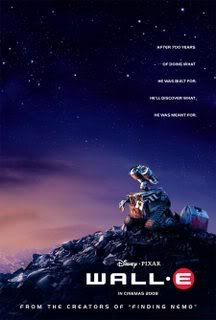 WALL-E (2008) - The strongest Pixar film yet, and one of the best films of the year so far. It borrows liberally from 70s Sci-fi and E.T., but the result is some astounding animation and what are some truly ballsy creative decisions. Children might squirm during the first half hour (which contains nearly no dialogue), but the film rapidly picks up speed when the main characters leave earth. Some might read it as a slick environmentalist meditation, but it really just carries on the best science fiction tradition of showing us a vision of the future that works as a commentary on the present.
WALL-E (2008) - The strongest Pixar film yet, and one of the best films of the year so far. It borrows liberally from 70s Sci-fi and E.T., but the result is some astounding animation and what are some truly ballsy creative decisions. Children might squirm during the first half hour (which contains nearly no dialogue), but the film rapidly picks up speed when the main characters leave earth. Some might read it as a slick environmentalist meditation, but it really just carries on the best science fiction tradition of showing us a vision of the future that works as a commentary on the present.
